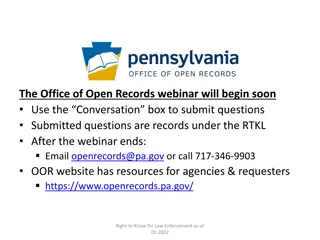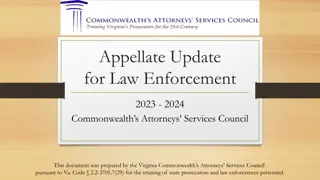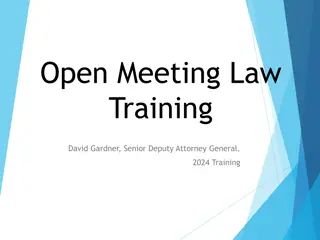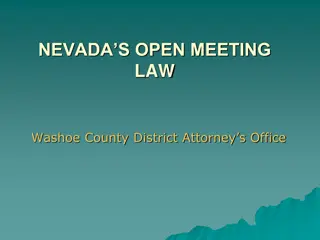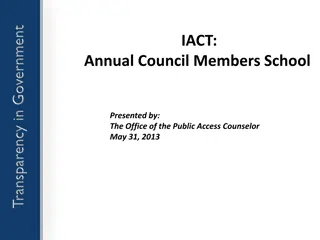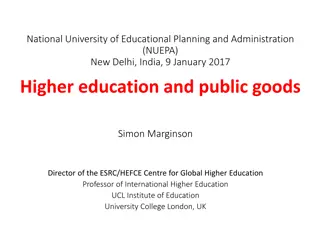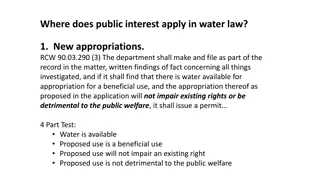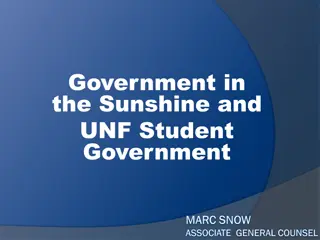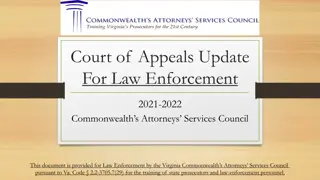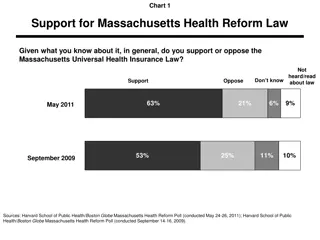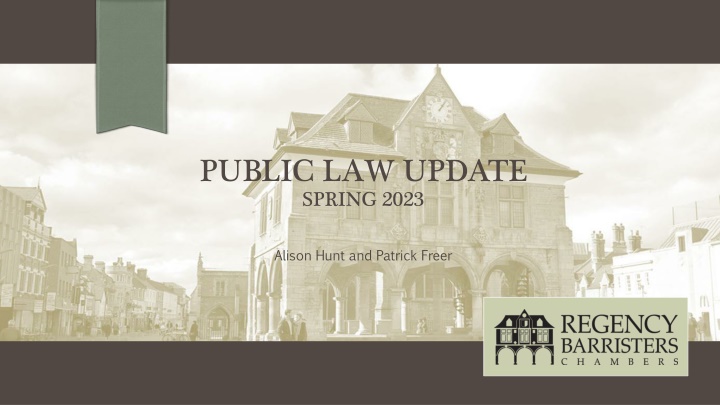
Transparency in Public Law Proceedings: Enhancing Confidence and Accountability
Explore the evolution of transparency in public law proceedings, with a focus on maintaining confidentiality while enhancing public confidence. Key points, notable cases, and the impact of reporting pilots are discussed.
Download Presentation

Please find below an Image/Link to download the presentation.
The content on the website is provided AS IS for your information and personal use only. It may not be sold, licensed, or shared on other websites without obtaining consent from the author. If you encounter any issues during the download, it is possible that the publisher has removed the file from their server.
You are allowed to download the files provided on this website for personal or commercial use, subject to the condition that they are used lawfully. All files are the property of their respective owners.
The content on the website is provided AS IS for your information and personal use only. It may not be sold, licensed, or shared on other websites without obtaining consent from the author.
E N D
Presentation Transcript
PUBLIC LAW UPDATE SPRING 2023 Alison Hunt and Patrick Freer
Agenda Alison Hunt Transparency in public law family proceedings Patrick Freer Parents with learning needs Joint Notable cases over last year Questions and Answers Session
Transparency and Reporting of Public Law Proceedings For the times, they are a-changing .. Bob Dylan, 1964
Transparency and Reporting of Public Law Proceedings Sir Andrew McFarlane, The President of the Family Division Confidence and Confidentiality: Transparency in the Family Court, Confidence and Confidentiality: Transparency in the Family Court, October 2021 The review has focused upon the dual goals of enhancing public confidence in the Family Justice system, whilst at the same time maintaining the anonymity of those families and children who turn to it for protection. These twin principles of confidence and confidentiality view, mutually exclusive and it is possible to achieve both goals. the time has come for accredited media representatives to be able, not only to attend hearings, but to report publicly on what they see and hear. confidence and confidentiality are not, in my
Transparency and Reporting of Public Law Proceedings What next? Transparency Implementation Group, December 2021 Sub-group headed by Dame Nathalie Lieven Reporting Pilot Rolled out in 3 centres from January 2023 January 2024 Cardiff, Carlisle and Leeds Why? .carefully chosen to ensure a representative mix for sampling and evaluation, a mix of rural and urban communities
Transparency and Reporting of Public Law Proceedings Key points: Subject to the principles of protection of the anonymity of any children involved, unless the judge orders otherwise Balance Article 8 rights (family) and Article 10 rights (press) Ensure the Article 6 rights of the family and parties Microsoft Word Microsoft Word - - The Reporting Pilot The Reporting Pilot - - Guidance.docx (judiciary.uk) Guidance.docx (judiciary.uk)
Transparency and Reporting of Public Law Proceedings Who may attend? Only pilot reporters although journalists can still attend, as they can now. Includes legal bloggers. FPR r.27.11
Transparency and Reporting of Public Law Proceedings Transparency Order Made by the Court at any hearing attended by a pilot reporter. Can be modified by the court to fit the circumstances of the case, can change its mind at any point and prevent further reporting. Remains in place until subject child reaches the age of 18. https://www.judiciary.uk/wp https://www.judiciary.uk/wp- -content/uploads/2023/01/Transparency content/uploads/2023/01/Transparency- -Order Order- -Final.docx Final.docx
Transparency and Reporting of Public Law Proceedings What cases will be considered in the pilot? Public and (private law) orders under Parts II and IV Children Act 1989, including FDAC cases, and applications to discharge, vary or enforce existing orders. All applications for placement orders (made within care proceedings) up to the point the order is made or application concluded. All applications under the inherent jurisdiction of the High Court, including applications to authorise the deprivation of a child s liberty. All levels of judge (currently not magistrates) Not the Court of Appeal
Transparency and Reporting of Public Law Proceedings What can the pilot reporter see? Documents drafted by advocates or the parties if they are litigants in person: Case outlines, skeleton arguments, summaries, position statements, threshold documents, and chronologies. Any indices from the Court bundle. Not hard copies, not redacted.
Transparency and Reporting of Public Law Proceedings How does this affect us? (apart from the Fear!) Parties and advocates must consider the issue prior to the hearing. Transparency should form part of the agenda for every advocates meeting or pre-hearing discussion. We (and our clients) are expected to work constructively with pilot reporters.
Transparency and Reporting of Public Law Proceedings What next? Independently evaluated By whom? The Ministry of Justice How? Specialist social scientists to evaluate the process and the impact on stakeholders. What will be considered as a success? As a failure?
Transparency and Reporting of Public Law Proceedings In the media: BBC Radio 4 Today Sanchia Berg and Katie Inman An experiment in open justice in the family courts 10 March 2023
Transparency and Reporting of Public Law Proceedings Dame Nathalie Lieven, Today, BBC Radio 4 Important that the public understand that the Family Justice System works really hard to keep families together. Huge benefit in greater transparency to the families and children we serve. We are doing the pilot to work out what works, what doesn t work, what needs to be changed, but there s a very clear intention to increase transparency across the Family Justice System in a number of different ways going forward.
Parents with intellectual impairment Sir Andrew McFarlane keynote speech at the Aspire Conference, Exeter, February 2023 The Need to be Alert
What is a learning disability? 1) Significant impairment of intellectual functioning 2) Significant impairment of adaptive/social functioning 3) Onset before the age of adulthood - British Psychological Society 2018 Report
Good Enough Parenting and the intellectually impaired parent Settled authority: a. No Order Principle b. Hedley J Re L c. Good enough parenting Q: Is this modified when dealing with an intellectually impaired parent? Re G & A [2006] NIFam 8 Gillen J Good Enough Parenting With Support
Responsibility on Local Authority A line to be drawn Sir James Mumby Re D (a Child No.3) [2016] EWFC 1 Gap between what parents could offer and what was needed simply too large to be capable of being bridged by even the most extensive support package. Supported parenting v substituted parenting Note: Nuffield Foundation is currently researching meaning of substituted Note: Nuffield Foundation is currently researching meaning of substituted parenting in family courts parenting in family courts due April 2023. due April 2023.
Addendum In Re H (Parents with learning difficulties: risk of harm) [2023] EWCA Civ 59, the Court of Appeal provided guidance on how the court should evaluate support plans, which aim to enable a child to remain in the care of their parents with learning difficulties, to determine whether they amount to substitute parenting Judges need to be wary of arguments about substituted parenting . The judge did not adequately scrutinise the evidence about the support needed for the parents to care for H. The starting point should have been, first, to identify and describe the level of support needed by the family, secondly ascertain what can and should be being done under the local authority s obligations, and thirdly to determine whether, with that in place, the child s welfare needs will be met. This involves a careful assessment of what the package would look like, how practical it is and how intrusive it would be for the child. That process was simply not carried out in this case.
Section 20 Consent For section 20 to be truly voluntary, parents must understand what they are agreeing to in particular right in most cases to remove their child. 2017 Report, Family Rights Group information about section 20 could be provided in visual and other means. Importance of independent advocacy President: particular need to be alert to that factor when it is unlikely psychological report will be available.
Ensuring parents understand proceedings and judgments Parents lacking capacity v parents with learning difficulties Not all parents will be eligible for a litigation friend (rare) Critical these vulnerable parties should understand and participate fully Article 6 ECHR, duty on LAs and Courts Practitioners should have regard to Part 3A and PD3AA FPR
Intermediaries and other support All familiar with the excellent work of most intermediaries Critical to ensure vulnerable witness and party can engage fully in proceedings. Intermediary s role should be at the forefront of the minds of practitioners and the court throughout One positive of remote hearings clients can see the lawyers faces and expressions. Role of the court when intermediary is not present active up to and including full participation directions
Sources of information and support Equal Treatment Bench Book The Advocates Gateway TAG recommended by PD3AA Lay advocates, intermediary and cognitive assessments
After hearings Judgments need to be clear, language and approach of utmost importance May start with clear accessibility summary. Creative approaches encouraged see Z LBC v Mother [2022] EWFC 63 summary provided to a mother. Includes other documents e.g. threshold
Summary BE ALERT Risk of being over polite must raise issue and address it Provision of independent advocacy where appropriate Use the toolkits and resources Applies to all professionals, courts, social workers, lawyers
Notable cases over last 12 months Quick run through of some interesting cases with citations for those interested: Re B (adequacy of reasons) [2022] EWCA Civ 407 importance of giving clear and detailed findings on threshold criteria Re G (Child Post-Mortem Report: Delays) [2022] EWFC 55 dealing with delays in forensic pathology when family proceedings must continue without delay.
Notable cases over last 12 months Peterborough City Council v K, L, M, N and P & Ors [2022] EWFC 61 successful appeal against a costs order in care proceedings against a local authority Blackpool Borough Council v HT (A Minor) & Ors [2022] EWHC 1480 (Fam) Deprivation of liberty lack of support and joined up therapeutic care
Notable cases over last 12 months S (A Child) (Jurisdiction) [2022] EWHC 1720 (Fam) - helpful reminder of the jurisdictional framework of international children cases following our departure from the European Union Re D (A Child: Placement Order) [2022] EWCA Civ 896 effective reminder of nothing else will do when a grandmother successfully appealed a placement order
Notable cases over last 12 months CV (A Child)(Placement Order) [2022] EWCA Civ 930 failure to properly consider long term foster care as an option child of 3 with complex medical needs F And G (Children : Sexual Abuse Allegations) [2022] EWCA Civ 1002 another case about proper consideration of long term foster care.
Notable cases over last 12 months Barnsley Metropolitan District Council v VW and Others [2022] EWFC 83 Proportionality of 5 day fact-find, when threshold is crossed on concessions of the mother, and care and placement orders unopposed W-A (Children: Foreign Conviction) [2022] EWCA Civ 1118 concerning admissibility of foreign convictions in England and Wales care proceedings
Notable cases over last 12 months Hertfordshire County Council v Mother & Ors [2022] EWFC 106 criticism of expert witness in NAI case confirmed a court can make findings in respect of expert Re A (Children) (Pool of Perpetrators) [2022] EWCA Civ 1248 approaching pool of possible perpetrators endorsing Re B [2019]
Notable cases over last 12 months E (A Child), Re [2022] EWHC 2650 (Fam) - This was a deprivation of liberty case in which the DoLs order was extended until the child's 18th birthday and the parents' application to discharge a care order was refused A Local Authority v F & Ors [2022] EWFC 127 a wider application of s91(14) orders and interplay with Domestic Abuse Act 2021 likely more common
Notable cases over last 12 months Re C & Others (Care Proceedings: Fact-finding) [2023] EWCA Civ 38 Criticism of lengthy judgment with multiple annexes Manchester City Council v P (Refusal of Restrictions on Mobile Phone) (Rev1) [2023] EWHC 133 (Fam) DoLs and restrictions on mobile/internet etc. Not DoLs, Section 33
Notable cases over last 12 months Re H (Parents With Learning Difficulties: Risk of Harm)[2023] EWCA Civ 59 on parenting with support (see above) Re M (Adoption: Notification of Birth Father) [2023] EWFC 17 Notification of birth father against wishes of the mother, consenting to adoption. P, H-L (CHILDREN) (Mobile Phone Extraction) [2023] EWCA Civ 206 whether third parties need notifying when seeking forensic phone analysis of a child
Thank You Alison Hunt Patrick Freer



